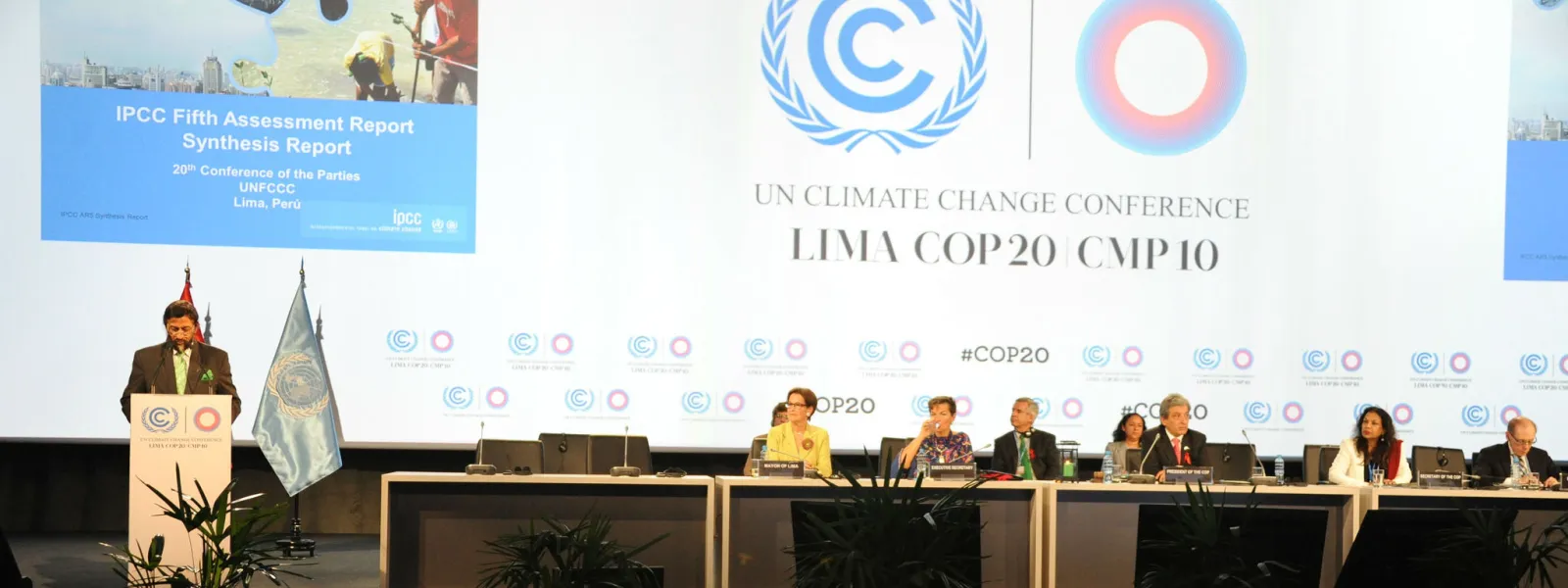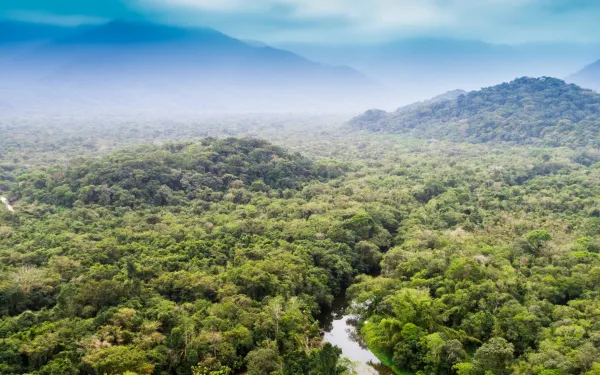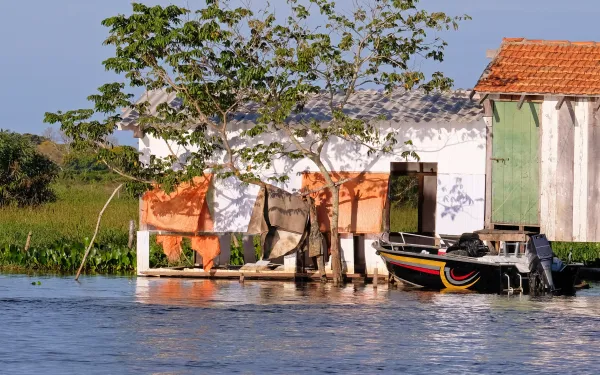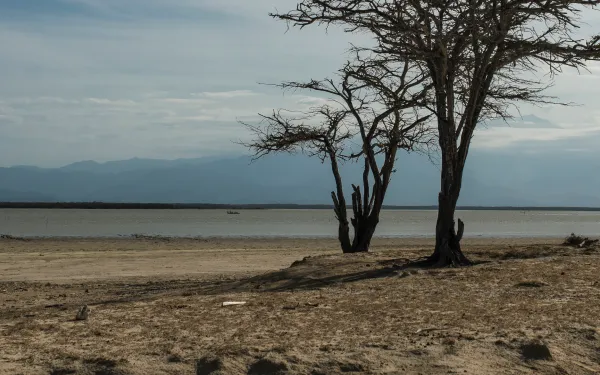
Project
Photo: UNFCCCMonitoring the UN Climate Negotiations
As changes in climate become more extreme, their affects are being hardest felt throughout developing countries. Since 1994, the United Nations Framework Convention on Climate Change has laid out actions to limit the increase of global average temperatures and confront the impacts of climate change.
The States that are Parties to the Convention meet every year in the so-called Conference of the Parties (COP) to review their commitments, the progress made in fulfilling them, and pending challenges in the global fight against the climate crisis.
At COP21 in 2015, they adopted the Paris Agreement, which seeks to strengthen the global response to the climate emergency, establishing a common framework for all countries to work on the basis of their capacities and through the presentation of Nationally Determined Contributions (NDC) that will:
- Limit the increase in global temperatures to 2°C compared to pre-industrial levels and continue efforts to limit it to 1.5°C;
- Increase the capacity of countries to adapt to the impacts of climate change; and
- Ensure that financing responds to the goal of reducing greenhouse gas emissions.
Our focus areas
THE CLIMATE CRISIS AND HUMAN RIGHTS
The climate crisis, due to its transversal character, has repercussions in various fields, geographies, contexts and people. In this regard, the Preamble to the Paris Agreement states that it is the obligation of States to "respect, promote and fulfill their respective obligations on human rights, the right to health, the rights of indigenous peoples, local communities, migrants, children, persons with disabilities and people in vulnerable situations and the right to development, as well as gender equality, the empowerment of women and intergenerational equity."
AIDA at the COP
COP25: Chile-Madrid 2019
At COP25 in Madrid, Spain, we advocated for the inclusion of the human rights perspective in various agenda items. We promoted the incorporation of broad socio-environmental safeguards in the regulation of Article 6 of the Paris Agreement, which refers to carbon markets. We closely followed the adoption of the Gender Action Plan, as well as the Santiago Network, created "to catalyze technical assistance […] in developing countries that are particularly vulnerable to the adverse affects of climate change." We also encouraged the inclusion of ambitious and measurable targets for the reduction of short-lived climate pollutants in the climate commitments of States.
Related projects

Actions and reasons to preserve the Amazon
Shared by eight countries and home to 10 percent of the planet's known biodiversity, the Amazon is the largest tropical forest in the world. It’s also a global climate stabilizer, storing between 90 and 140 billion metric tons of carbon dioxide (CO2)—one of the most harmful greenhouse gases that, when released, accelerates the climate crisis. For more than 470 communities of indigenous and traditional peoples, the Amazon is an ancestral place of life, from which they have developed their ways of being in the world. However, the rainforest is facing various threats—including colonization, deforestation and extractive activities—that increase its vulnerability and affect the human rights of those who inhabit and protect it. These pressures have caused some areas of the Amazon to emit more carbon dioxide than they absorb. This situation poses the challenge of implementing strategies for the legal protection of Amazonian territories that articulate with the struggles of affected peoples. At AIDA, we have strengthened these strategies and have supported community processes aimed at combating the damage caused by mining and oil exploitation in Amazonian territories in three countries. With hopes currently pinned on the incoming government of Lula da Silva in Brazil—who announced his goal of reducing deforestation in the Amazon to zero by 2030—the preservation of this ecosystem requires political will and strong coordinated and cross-border actions. In this regard, Colombia proposed a common front to defend the Amazon rainforest. Strengthening legal defense AIDA's work strengthened the capacities of national organizations in Brazil, Ecuador and Peru for legal defense of the Amazon. Brazil: By highlighting the shortcomings of its environmental impact study, we helped ensure that the communities affected by the Volta Grande mining project of the Canadian company Belo Sun are included in the environmental authorization process and that the state is obligated to consult with them to obtain their consent. We also prepared a report for UN agencies in which we identified measures to guarantee the safety of environmental defenders in the Amazon region. Ecuador: We strengthened litigation strategies to halt the implementation of a decree by which the government seeks to expand mining exploitation in the country, with serious impacts for the Amazon region. We also generated greater understanding of the tools needed to develop strategic litigation and improve the communication skills of indigenous peoples. Perú: We supported the acceleration of litigation aimed at ensuring the repair and maintenance of the Norperuano oil pipeline, whose operation has generated serious environmental impacts and human rights violations for indigenous peoples affected by oil spills. In all three countries, we were able to advance towards a more precise understanding of the legal protection needs of the Amazon and the contexts in which such strategies should be developed. This was made possible by working in partnership with national and local organizations and indigenous peoples. Arguments to protect the ecosystem There are many reasons to preserve the Amazon, whose importance is regional and global. In order to strengthen communication efforts linked to the legal protection of the ecosystem, AIDA has developed two infographics that present in a schematic and didactic way the arguments for defending the Amazon territories, as well as their inhabitants, in court. The focus of one of the infographics is the vast biodiversity contained in the Amazon. Some figures show its high levels of richness: 40,000 species of plants; 16,000 of trees; 3,000 of fish; 1,300 of birds; more than 430 of mammals; more than 1,000 of amphibians; and more than 400 species of reptiles; therefore, any intervention in the Amazon rainforest must start from the knowledge of it as a highly diverse, complex and interconnected territory. The richness of the Amazon is also cultural, represented in the indigenous and traditional peoples that have inhabited the ecosystem since ancestral times, whose diversity is present in 86 languages and 650 dialects. The Amazon: A megadiverse region (in Spanish) The other infographic illustrates the capacity of the Amazon to regulate the humidity and climate of the continent. In addition to storing large amounts of carbon dioxide, the ecosystem absorbs half of the solar energy it receives through the evaporation of water from its foliage. Most of the trapped energy is released when the vapor condenses to form clouds and rain. Among other things, the Amazon recycles between 50% and 70% of annual precipitation, pumping some seven billion tons of water a year into the atmosphere through evapotranspiration. The Amazon: A global climate regulator (in Spanish) The Amazon and its care are emblematic of the intrinsic relationship and balance that must exist between a healthy environment and human existence. "The spirits that give us life exist in the forest, the water and the air. We all have a correlation," said Humberto, a member of a community in the Ecuadorian Amazon. "That existence is what we call life—our own home, the pharmacy, nature or what we can call, in general, the existence of man and nature."
Read more
Urgent alert on human rights threats due to Pantanal degradation
The Pantanal is the world’s largest freshwater wetland. It’s nearly 18 million hectares stretch across Brazil, Bolivia, and Paraguay, making a home for thousands of species, some of which are in danger of extinction. It hosts six different Ramsar sites, wetlands of international importance, and has been designated as a Biosphere Reserve and UNESCO World Heritage Site. Forest fires, drought, and deforestation, due largely to the expansion of industrial agriculture and the construction of hydroelectric dams, have destroyed millions of hectares of this wetland. The devastation is not only environmental, but it has also affected the lives of those who inhabit the region, threatening their right to live in a healthy environment. In addition, the Pantanal provides resources and sustains the livelihoods of about 1.5 million people. More than 270 communities—including indigenous peoples, cattle ranchers and riparian communities—depend directly or indirectly on the wetland, although its relevance transcends the region and is fundamental to the well-being of more than 10 million people. However, the Pantanal is at risk of collapse. Only 5 percent of its area is protected. In recent years, forest fires, drought and deforestation—associated with the expansion of agribusiness and the construction of dams—have destroyed millions of hectares of this wetland. This damage violates the rights of local people and communities. Environmental Damage and Human Rights The intensification of extractive activities during recent years, principally ranching and industrial agriculture, have led to unprecedented droughts and fires in the Pantanal. In 2020, wildfires destroyed more than 4.5 million hectares, almost one-third of the wetland’s area. And so far in 2022, more than 123 thousand hectares have been consumed by fires, 26 percent more than had burned during the same time period in 2021. In addition to the fires, drought has been intensifying. One of the most serious cases is that of the Guató people of Baía dos Guató, Brazil, who have lost almost 90 percent of their territory to fire. "The fires destroyed crops, burned houses. The fire destroyed a large part of our territory, destroying many trees, animals, birds, damaging our animals and plants and our food security, because it destroyed our crops," said one of its members. "Everything is coming to an end." Fires in the Pantanal have caused the loss of forests and biodiversity, aggravating the climate crisis. They also impact the health and livelihoods of nearby communities by destroying their homes and territories, making them more susceptible to health problems, especially respiratory problems. Fires have resulted in the loss of seeds and the death of animals. The drought especially impacts communities that depend on fishing for food and income (about 70 percent of Pantanal villagers depend on fishing as their main livelihood). Women engaged in artisanal bait collection for sport fishing have been particularly affected. The traditional communities in the region have also been severely impacted, as the fire has reached all of their territories, destroying almost half of them. This has repercussions on the development of their cultural practices, as for many Pantanal communities the connection with the land plays an essential role. They obtain from nature the plants for their traditional medicines and raw materials to build their houses, utensils and handicrafts. For the Yshir, for example, the destruction of the Pantanal threatens their belief system and cosmology (where the forest, rivers and wildlife are central), preventing them from maintaining their traditional ceremonies based on these beliefs. An Emergency Call The Interamerican Association for Environmental Defense (AIDA) and Ecologia e Ação (ECOA) prepared an urgent alert for United Nations Human Rights Rapporteurs to report on the critical situation of the Pantanal and request that they issue recommendations to the three countries where the wetland is located in order to prevent the recurrence of fires, ensure the restoration of ecosystems and guarantee the rights of local populations. We also ask them to visit the site to learn about its situation first hand and to give their recommendations a greater force and sense of urgency. The biological wealth of the Pantanal is incalculable. The site provides several ecosystem services: flood flow regulation, climate regulation, soil fertility control, biological control, biodiversity maintenance and is a source of water, food and raw materials for the population. The environmental and social importance of the Pantanal requires urgent, coordinated, transboundary and effective actions to ensure its restoration and protection. It is time to join forces and take care of the enormous natural and cultural wealth of this biome that is so important for life.
Read more
Swiss OECD Point of Contact calls on Glencore to comply with due diligence on coal mine in Colombia
Switzerland’s National Contact Point (NCP) for the Organization for Economic Cooperation and Development (OECD) recommended that the multinational as the sole owner of the Cerrejón mine in Colombia ensure “its policies and due diligence measures promote responsible business conduct at Cerrejón” in its final statement on the complaint filed against Glencore. The NCP further implored Glencore to maintain a dialogue with NGOs and representatives of the indigenous Wayúu and Afro-Colombian communities affected by the mine's operations. In January 2021, a coalition of national and international organizations—comprised of GLAN, CAJAR, AIDA, CINEP, Ask! ABColombia and Christian Aid Ireland—filed five complaints with the OECD NCPs in Ireland, the United Kingdom, Switzerland, and Australia to denounce the various detrimental impacts of the Cerrejón mine, operated by Carbones del Cerrejón. The coalition detaile the disastrous impacts on the lives and human rights of the indigenous, Afro-descendant and other rural populations of La Guajira resulting from operation of the Cerrejón mine and Carbones de Cerrejón’s lack of due diligence in its operations, leading to non-compliance with OECD guidelines for multinational companies. The coalition filed the complaints against ESB (Electricity Supply Board), the Irish state-owned company that buys coal from the Cerrejón mine; CMC (Coal Marketing Company), based in Dublin, Ireland, which markets the coal from Cerrejón, and the multinational mining companies that jointly own Carbones del Cerrejón: BHP, Anglo American and Glencore. In response to the coalition’s complaints, the Swiss NCP noted that "the Australian and British NCPs will publish, in accordance with their rules of procedure, Final Statements regarding BHP and Anglo American respectively.” The complaints in Ireland are still pending. The Swiss NCP’s statement did not address the main duty of its mandate—to ensure the implementation of the OECD Guidelines for Multinational Enterprises. Instead, the Swiss NCP statement merely reiterated generic existing duties and did not make substantive recommendations in response to the details or the gravity of the Cerrejón’s human rights abuses and violations documented in the complaint. The Swiss NCP conducted its review with serious irregularities and asymmetries in its treatment of the parties. The Swiss NCP failed to provide the affected Wayuu indigenous and Afro-descendant communities with access to information about the review or any guarantees of participation in the review. These asymmetries and irregularities resulted in Glencore’s impunity for the serious human rights violations committed by the mining operations of Carbones del Cerrejón. Our coalition eventually chose to withdraw from the process in protest of the Swiss NCP’s disfavorable treatment of the coalition and favorable treatment of Glencore. Our experience with the Swiss NCP highlights how the complex web and architecture of impunity and asymmetry in international processes favors multinational companies, resulting in abysmal gaps in justice for victims of multinational companies’ human rights abuses and violations. Given the enormity of the Swiss NCP’s incompetence, negligence, and inconsistency in its functions, we reject the NCP’s final statement which suggests that GLAN and the coalition members are to blame for failure of the mediation process. In this statement, the NCP ignores the impacts of its own deficiencies on the mediation process. The way the Swiss NCP in structured the mediation process placed a greater burden on the complainant’s ability to access and participate in the mechanism than on Glencore. Despite these disadvantages, the coalition participated with the utmost diligence and good faith throughout the entire procedure. The Swiss NCP’s incompetence in this instance is part of its pattern of favoritism of multinationals. For example, the Swiss NCP mishandled the complaint against Sygenta for its harm to farmers in India. The NCP's improper practices led Marcos Orellana, UN Special Rapporteur on Toxic Substances and Human Rights, to state that the Swiss NCP set “a bad precedent that underlines the weaknesses of the National Contact Points for the OECD Guidelines.” Because the Swiss legal accountability mechanisms do so little to regulate the conduct of Glencore—a company with a history of corruption and serious allegations of human rights abuses and violations associated with its global activities—the Swiss government is implicated in Glencore’s abuses. Although the OECD guidelines are voluntary for companies, countries that adhere to guidelines make a binding commitment to implement them. The Swiss NCP's inadequate handling of this complaint and the Swiss government’s failure to comply with its functions and the obligations relating to respect for human rights, leads us to question degree of the Swiss government’s complicity in these abuses and how this complicity creates an environment of tolerance for corporate violations and abuses. What is clear is that the OCED’s voluntary mechanism has become a way to mask corporate violations and facilitate corporate impunity. Although the Swiss government does not grant real and effective access to justice for victims of Glencore’s violations as an investor in Carbones del Cerrejón, Glencore is able make use of its guarantees as an investor—as established in the Foreign Investment Protection Agreement between Colombia and Switzerland—to sue the Colombian government over a court ruling that protected the human rights of the Wayuu people from Carbones del Cerrejón’s actions. In the face of this asymmetry in justice between the parties, it is concerning that Colombia choses to maintain this agreement. We reiterate the inadequacy of non-judicial mechanisms to hold multinational corporations accountable. Cases such as this highlight the need for binding due diligence legislation and a treaty regarding companies and human rights that includes real accountability for abuses resulting from seemingly unlimited transnational corporate power. Signed: Interamerican Association for Environmental Defense (AIDA) José Alvear Restrepo Lawyers' Collective (CAJAR) Center for Research and Popular Education (CINEP) Christian Aid ASK ABColombia Global Legal Action Network (GLAN) press contact: Victor Quintanilla (Mexico), AIDA, [email protected], +525570522107
Read more